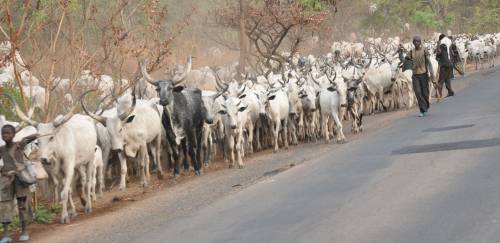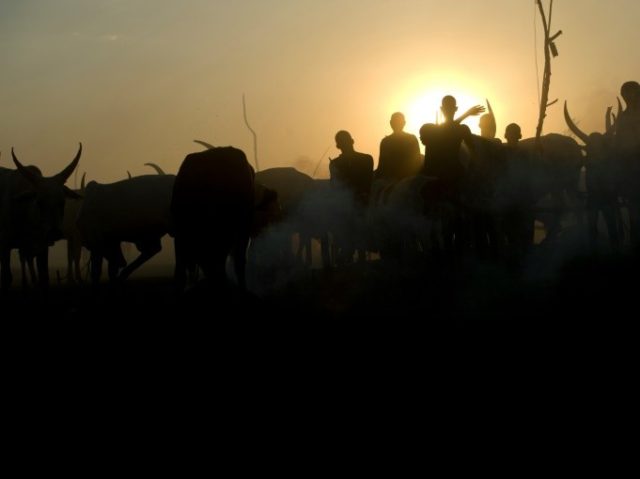This morning’s key headlines from GenerationalDynamics.com
- Violence in Nigeria grows over clashes between herders and farmers
- Oklahoma! – The farmer and the cowboy should be friends
Violence in Nigeria grows over clashes between herders and farmers

Fulani herders in Nigeria (royaltimes.net)
I’ve written many times that many ethnic wars are based on fundamental clashes between farmer tribes and herder tribes. In country after country, there a classic and recurring battle between herders and farmers: in Central African Republic, Rwanda, Burundi, Kenya, Sudan, South Sudan, and even America in the 1800s. The farmers accuse the herders of letting the cattle eat their crops, while the herders accuse the farmers of planting on land that is meant for grazing. If the farmers put up fences, then the herders knock them down.
In Nigeria, it is estimated that 2,500 people were killed and more than 62,000 people lost their homes in 2016 in just four provinces, Kaduna, Plateau, Nasarawa and Benue states. The federal government lost $13.7 billion in revenue as a result of these conflicts. According to former Head of State, General Abdulsalami Abubakar: “There is a breakdown of communal trust, conflict resolution mechanisms and these conflicts have become deadly,” and “the current situation is threatening the fragile peace in the nation.”
A report last month from the International Crisis Group describes how the clashes have been getting more widespread and violent, and are becoming sectarian, as the herders are mostly Fulani Muslims from northern Nigeria, and the farmers are most Christians from southern Nigeria:
Violent conflicts between nomadic herders from northern Nigeria and sedentary agrarian communities in the central and southern zones have escalated in recent years and are spreading southward, threatening the country’s security and stability. With an estimated death toll of approximately 2,500 people in 2016, these clashes are becoming as potentially dangerous as the Boko Haram insurgency in the north east. …
Familiar problems – relating to land and water use, obstruction of traditional migration routes, livestock theft and crop damage – tend to trigger these disputes. But their roots run deeper. Drought and desertification have degraded pastures, dried up many natural water sources across Nigeria’s far-northern Sahelian belt and forced large numbers of herders to migrate south in search of grassland and water for their herds. Insecurity in many northern states (a consequence of the Boko Haram insurgency in the north east and of less-well-reported rural banditry and cattle rustling in the north-west and north-central zones) also prompts increasing numbers of herdsmen to migrate south. The growth of human settlements, expansion of public infrastructure and acquisition of land by large-scale farmers and other private commercial interests, have deprived herders of grazing reserves designated by the post-independence government of the former Northern region (now split into nineteen states).
…
The spread of conflict into southern states is aggravating already fragile relations among the country’s major regional, ethnic and religious groups. The south’s majority Christian communities resent the influx of predominantly Muslim herders, portrayed in some narratives as an “Islamisation force”. Herders are mostly Fulani, lending an ethnic dimension to strife. Insofar as the Fulani spread across many West and Central African countries, any major confrontation between them and other Nigerian groups could have regional repercussions, drawing in fighters from neighboring countries.
The Fulani herders are now sometimes equated to terror groups like Boko Haram as a consequence of their attacks on farmers. The Fulani herders are also playing a big part in the generational crisis civil war in Central African Republic, as we have described in the past.
Nigeria’s president, Muhammadu Buhari, is a Fulani and owns large herds of cattle. He has been accused of complicity in the Fulani attacks on farmers.
In order to protect farmers, Benue State, which is in Nigeria’s middle belt separating the north from the south, passed an “Anti-Grazing Law.” The law was passed in May but only came into effect on Wednesday. The law prohibits open grazing of cattle and requires herders to maintain their herds of cattle on ranches. The law is being accompanied by a training program to teach herders modern methods of ranching.
However, the new law is somewhat laughable, as there is no way that it will stop Fulani herder attacks on farmers. On Thursday, an attack by suspected Fulani herdsmen on a village in Benue State resulted in one death and many others missing. Daily Trust (Abuja) and International Crisis Group and Vanguard (Nigeria) and The Nation (Nigeria) and Daily Post (Nigeria)
Related Articles
- UN Secretary-General in Central African Republic begs for more funding (26-Oct-2017)
- Kenya’s herders attack well-known conservationist, stoking tribal tensions (24-Apr-2017)
- Ban Ki Moon blames Darfur genocide on global warming (19-Jun-2007)
Oklahoma! – The farmer and the cowboy should be friends
Violent clashes between farmers and herders are not unique to Africa. They occur in any country that has a growing population and has both farmers and herders. In particular, there were many bloody battles between farmers and herders in 1800s and early 1900s America.
In 1941, those battles were still fresh in the lives of many alive at that time, and they were a sub-plot of the great Rodgers and Hammerstein Broadway musical Oklahoma!
One of the most festive song and dance production numbers in the show was “The farmer and the cowboy should be friends.”
The number is instructive to today’s audience’s because it provides hints of just how bitter the fight was between farmers and cowboys. The play takes place around 1900, just as Oklahoma was becoming a state. The lyrics begin:
Oh, the farmer and the cowboy should be friends,
Oh, the farmer and the cowboy should be friends.
One man likes to push a plough,
The other likes to chase a cow,
But that’s no reason why they cain’t be friends.Territory folks should stick together,
Territory folks should all be pals.
Cowboys dance with farmer’s daughters,
Farmers dance with the ranchers’ gals.
However, as the music and dancing continue, the farmers and cowboys start sniping at each other:
Eller:
The farmer should be sociable with the cowboy
If he rides by and ask for food and water
Don’t treat him like a louse
Make him welcome in your houseIke:
But be sure that you locked up your wife and daughters
The ensuing mass brawl is fully choreographed, as farmers and cowboys take swings at each other in time to the music.
If you would like to enjoy five minutes of music and fun, then check out the Youtube video of the number from the 1955 film. YouTube
KEYS: Generational Dynamics, Nigeria, Muhammadu Buhari, Fulani, herders, farmers, Kaduna, Plateau, Nasarawa, Benue, General Abdulsalami Abubakar, Central African Republic, Rwanda, Burundi, Kenya, Sudan, South Sudan, Rodgers and Hammerstein, Oklahoma!
Permanent web link to this article
Receive daily World View columns by e-mail

COMMENTS
Please let us know if you're having issues with commenting.